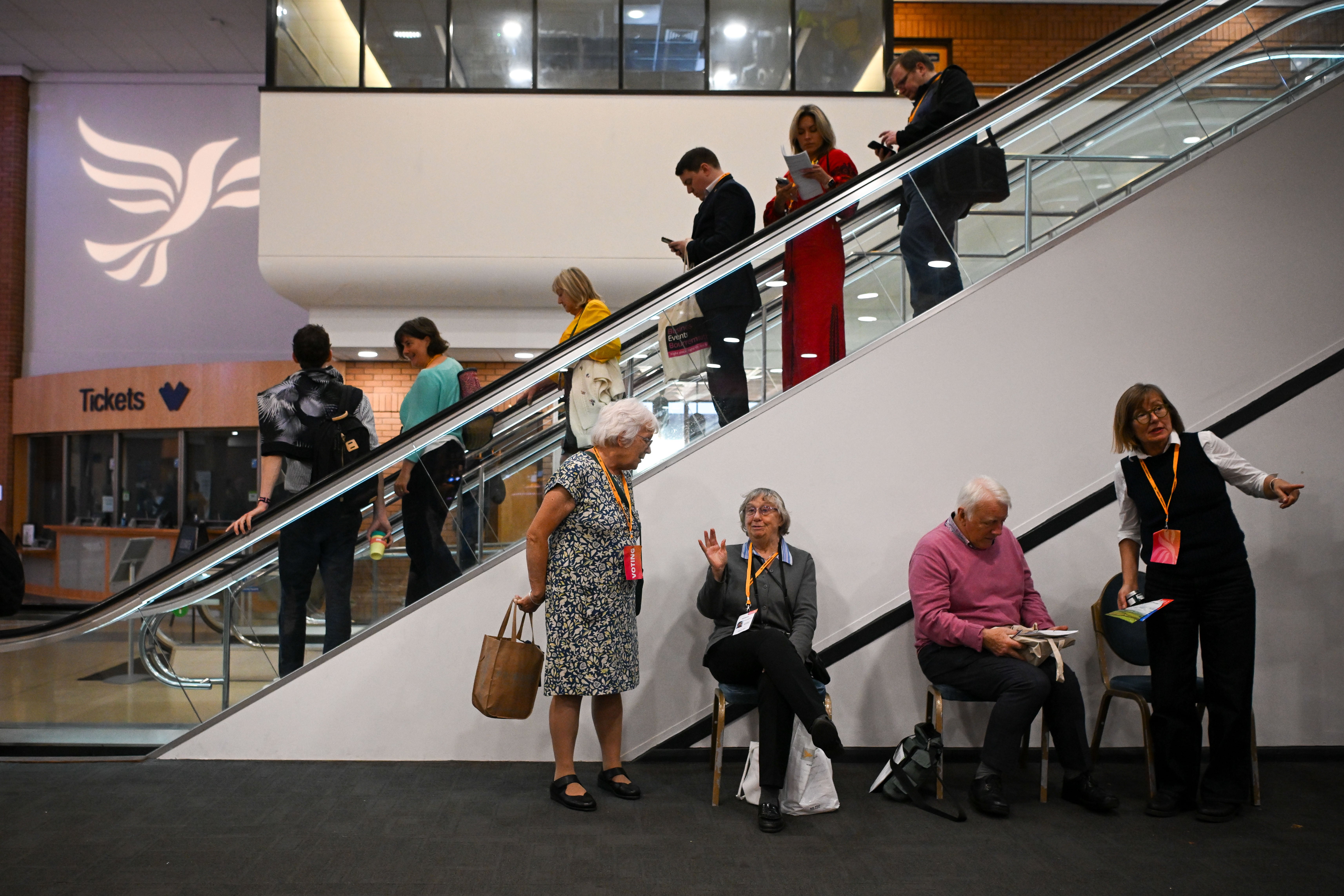Why votes matter more than policies for the Liberal Democrats at this election
The Lib Dems have much to look forward to but they need critical mass, as Sean O’Grady explains


Liberal Democrats, enjoying their first physical get-together since 2019, are in a bullish mood. The last general election was almost as disappointing for them as it was for Labour but, after Sir Keir Starmer’s life-saving surgery on Labour and the Tory collapse into disarray, much has changed. A rare moment of Liberal opportunity has opened up – another “gap in the clouds”, in the words of Jo Grimond, who led the party to its first postwar revival in the late 1950s.
It didn’t seem possible after the failures of 2019. The plan by then leader Jo Swinson to aggressively target the substantial Remain vote largely failed, and she even lost her own seat. However, the party has since started to thrive again, winning four by-elections and rebuilding their once formidable base in local government. The nation’s memories of the David Cameron and Nick Clegg coalition and the tuition fees fiasco seem to be fading at last, and the unpopularity of the Conservatives has created propitious conditions for a handsome haul of parliamentary seats. Sir Ed Davey is set to send them on their way to prepare for success, and the outside chance of holding the balance of power. Still, they’re not the force they were, and much of their future success lies out of their hands.
What do the Liberal Democrats stand for?
They’ll be glad you’re asking, because most of the time it’s not a question on many minds, and this is the one week in the year they get sustained media attention. They are the first party to produce something akin to an election manifesto.
Paradoxically, they’ve ditched one specific policy – putting 1 per cent on income tax for health and social care – in favour of some rather vaguer pledges. The traditional federalist stance on Europe has also been ditched, with Sir Ed declaring that rejoining the EU is off the table. The aim seems to be to try and reassure Conservative swing voters with the blandest of policy positions.
Their most controversial hard policy, a target for new housing, has survived after a rebellion led by the party’s youth wing – shades of the 1970s. The leadership plan to drop the pledge to build 380,000 new homes every year were wrecked by rebel activists. Their former leader Tim Farron called them “Thatcherites”; they think he’s a Nimby. Despite such rowdy scenes, the Lib Dems’ critics claim that they are all things to all voters, depending on where they’re standing.
The main planks of the prototype manifesto, “A Fair Deal”, are indeed entirely innocuous, and could pass just easily in a Labour or Conservative document:
1. A fair, prosperous and innovative economy that promotes opportunity and wellbeing.
2. Fair access to good public services and a strong social safety net.
3. A flourishing environment, with fair access to nature for all.
4. A strong United Kingdom and a fair international order.
5. A truly fair democracy, where everyone’s rights are respected and individuals and communities are empowered.
The party is also firmly in favour of kittens, Elmo and Sir David Attenborough.
So policy is irrelevant?
For tactical voters whose main motivation is simply to get the Tories out, it is. Usually that party will be Labour, and the Lib Dems won’t be contenders; but in many blue wall seats, especially in southern England, there will be Labour supporters who will vote for Sir Ed’s candidates regardless of policy differences, in order to defeat a Tory.

That said, the Lib Dems have sometimes benefited from a few targeted specific ideas. Paddy Ashdown, for example, raised his party’s profile by pledging a 1p in the pound tax rise to pay for schools, campaigning for Western intervention in the former Yugoslavia, and a commitment to European unity. There doesn’t seem that much for Sir Ed to focus on these days, though the issue of proportional representation will no doubt become fashionable again in the event of a hung parliament (with a Labour government pressed to push the agenda forward) or another Conservative victory.
Do the Liberal Democrats matter?
Not much at the national level, since they relinquished third-party status in the Commons to the SNP in 2015. That may change at the next election. If the stars of electoral politics align in their favour, they could pick up a few dozen Conservative constituencies (there are very few Labour-Lib Dem marginals) and hold the balance of power in a hung parliament if Labour starts to slip back. They could then try to press the case for proportional representation, at a time when many in Labour seem to be warming to the idea. Given the decline in SNP fortunes, the Lib Dems are also in a good position to win back third-party status, and thus get their weekly turn at prime minister’s questions, plus a few select committee chairs and extra parliamentary research funding.
A coalition with Labour, though a favourite media topic, feels unlikely after the 2010-15 experience, but the Lib Dems could make their influence felt with a supply and confidence agreement that would allow them to retain freedom of manoeuvre. But we’re getting ahead of ourselves. The Lib Dems will need to work very hard to rebuild anything like the base in southwest and southern England that they took for granted in the Ashdown-Kennedy-Cleggmania years. Only when they’ve recovered some critical mass can they dream again of a realignment of progressive politics.
Can Ed do it?
Yes, and why not. His profile will rise as the election campaign gets underway and the broadcast media rules on proportionate coverage kick in. LibDem leaders usually need to be around for a while and fight a couple of general elections to get recognition (the exception being Charles Kennedy who was something of an urbane television personality before his elevation to urbane statesman).
More broadly, conditions are more promising than at any time since 2015, and three out of the last four general elections have produced hung parliaments or a slim majority for the Tories. In other words, the 2019 “Get Brexit Done” election may have been an aberration, essentially a rerun of the 2016 referendum.
A return to something like the pattern of three-party politics that prevailed in the recent past could well lead to some unpredictable outcomes. That said, the Lib Dems still really do need to lift their national vote share from its current 10 per cent or so. Pushing it beyond the 12 per cent or so they won in 2019 shouldn’t be too much to ask. Or even better if they managed to push the vote share up to match the 17 per cent Ashdown scored in 1997.
Tactical voting will be a crucial factor in the fortunes of all the political parties, but it will need to be effective. The current by-election campaign in Mid Bedfordshire shows the danger: there are signs that Labour and the Lib Dems are jostling for clear challenger status and so risk splitting the anti-Tory vote, gifting the seat to Rishi Sunak. It’s not impossible, and at least confirms the Lib Dems and Labour aren’t engaged in a conspiracy. Perhaps they should be.






Join our commenting forum
Join thought-provoking conversations, follow other Independent readers and see their replies
Comments